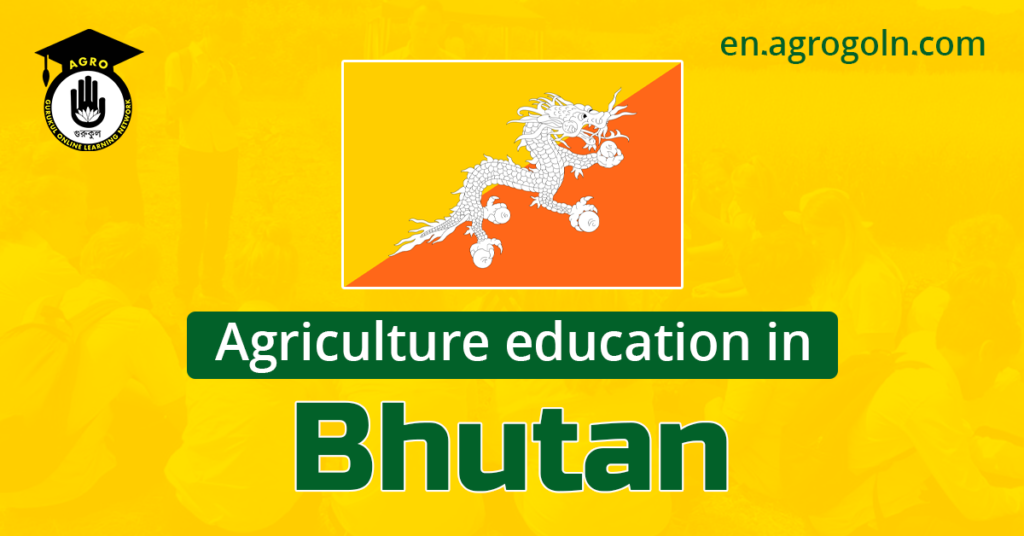Agricultural Education in Bhutan: Cultivating Sustainable Growth and Resilience. Agriculture plays a vital role in Bhutan’s economy and culture, with over 70% of the population engaged in agricultural activities. The country’s unique geography and varied climatic conditions provide a diverse range of agricultural opportunities. To harness the full potential of its agricultural sector, Bhutan has recognized the importance of agricultural education. Agricultural education in Bhutan has evolved significantly over the years, aligning with the country’s commitment to sustainable development and self-sufficiency. This article explores the history, current state, challenges, and future prospects of agricultural education in Bhutan.
Agricultural Education in Bhutan: Cultivating Sustainable Growth and Resilience
Historical Perspective:
Historically, agriculture in Bhutan has been passed down through generations as traditional knowledge and practices. The Bhutanese people have been skilled in sustainable farming techniques, managing natural resources, and preserving biodiversity. However, as the world progressed, there was a realization that formal agricultural education was essential to enhance productivity, improve livelihoods, and promote sustainable agricultural practices.
In 1964, the first formal agricultural training center, the National Agricultural Extension and Training Center (NAETC), was established in Paro. The center focused on providing basic agricultural training to farmers and extension agents. Over time, Bhutan realized the need for more specialized agricultural education and began establishing dedicated agricultural colleges and institutes.
Current State of Agricultural Education in Bhutan:
Presently, Bhutan offers various levels of agricultural education, ranging from certificate programs to advanced degrees. Some key institutions providing agricultural education in the country include:
- College of Natural Resources (CNR): Established in 2004, CNR is located in Lobesa, Punakha. It offers undergraduate and postgraduate programs in agriculture, forestry, and natural resources management. CNR plays a crucial role in training the next generation of agricultural professionals and conducting research to address agricultural challenges.
- Bhutanese Institute of Farming and Enterprise (BIFE): BIFE, located in Zhemgang, focuses on providing technical and vocational training to farmers and rural entrepreneurs. It aims to enhance their skills, knowledge, and income-generating capabilities through practical training.
- Rural Development Training Centre (RDTC): RDTC, based in Zhemgang, primarily targets extension officers and community leaders involved in rural development and agriculture. It offers various training programs to strengthen their capacities in extension services and community development.
- Agriculture Research and Development Centre (ARDC): ARDC has multiple centers across Bhutan, each focusing on specific agricultural research and development. These centers undertake research to improve agricultural productivity, conserve biodiversity, and promote sustainable agricultural practices.
- Regional Agriculture Research and Development Centres (RARDC): RARDCs are distributed in different regions, catering to the specific agricultural needs of each area. They conduct research on crops, livestock, and agroforestry suitable for their respective regions.
- Farmer Training Centres (FTC): FTCs are located in various districts and provide short-term agricultural training to farmers on modern agricultural techniques, pest management, soil conservation, and climate-smart agriculture.
Challenges in Agricultural Education:
Despite progress, agricultural education in Bhutan faces several challenges:
- Limited Resources: Bhutan’s small population and limited resources result in constrained funding for agricultural education and research institutions.
- Limited Access to Education: Many remote farming communities have limited access to formal agricultural education due to geographic constraints and lack of infrastructure.
- Outdated Curricula: Some institutions struggle to keep pace with rapidly evolving agricultural practices, leading to outdated curricula that may not address current challenges adequately.
- Brain Drain: Bhutan’s agricultural sector faces the issue of brain drain, where skilled agricultural professionals seek better opportunities abroad, leaving a gap in the country’s expertise.
- Climate Change: Climate change poses significant challenges to agriculture, affecting crop yields, livestock health, and natural resource management. Agricultural education needs to address climate resilience and adaptation.
Future Prospects and Way Forward:
Bhutan is committed to addressing these challenges and ensuring the continued growth and sustainability of its agricultural sector through targeted efforts in agricultural education. Some key strategies for the future include:
- Enhancing Funding: Increased investment in agricultural education and research will strengthen the capacity of institutions and enable them to offer cutting-edge programs and research opportunities.
- Promoting Digital Learning: Leveraging technology and digital platforms can enhance access to agricultural education for remote communities, allowing farmers to participate in online training programs and webinars.
- Collaboration and Partnerships: Partnerships with international agricultural institutions can facilitate knowledge exchange, research collaboration, and capacity building.
- Focus on Climate Resilience: Incorporating climate-smart agricultural practices in curricula can help farmers adapt to changing climate patterns and reduce vulnerability to climate-induced risks.
- Addressing Brain Drain: Encouraging incentives and career development opportunities can help retain skilled agricultural professionals within the country.
- Community Participation: Involving local communities and farmers in the design and implementation of agricultural education programs ensures relevance and ownership of initiatives.
Conclusion:
Agricultural education in Bhutan plays a pivotal role in empowering farmers, promoting sustainable practices, and ensuring food security and rural development. With an emphasis on modernization and self-sufficiency, Bhutan continues to invest in its agricultural education system, aligning it with the country’s Gross National Happiness philosophy.
By addressing challenges and fostering partnerships, Bhutan can build a resilient agricultural sector, equipped with knowledge, skills, and innovation to tackle emerging challenges and contribute to the nation’s sustainable development goals. Through a collective effort of the government, educational institutions, and communities, Bhutan’s agricultural education system can continue to thrive, cultivating a prosperous and sustainable future for the country’s agrarian landscape.
See more:

